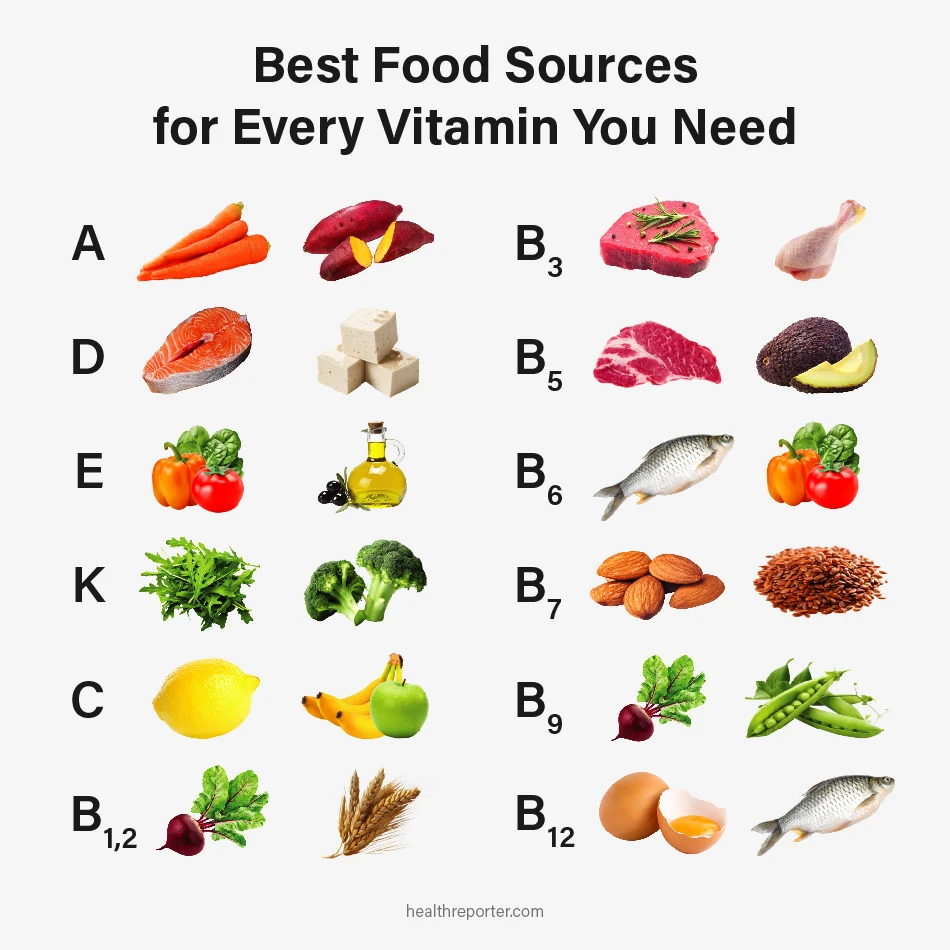Vitamins 101: What They Are and Why You Need Them

Vitamins are micronutrients that our bodies cannot develop or function optimally without.
From converting food into energy to strengthening bones and eyesight, vitamins are the shining stars of the health and nutrition world.
They’re powerful organic substances that play an unparalleled role in our overall well-being.
Different vitamins serve different bodily functions, and people need different amounts of each vitamin to stay healthy. Because our bodies cannot make most or all of these vitamins, we get them from food.
Learn what vitamins are, why your body needs them, how they can improve your overall health, and discover their excellent food sources.
What Are Vitamins?
Vitamins are organic compounds that humans need in small amounts for the proper functioning, growth, and maintenance of the body.
Vitamins are important for everything from converting energy from food to allowing your blood to carry oxygen to supporting your immune system. They also help strengthen bones and prevent oxidative stress throughout the body.
They’re carbon-containing substances that are important in several biochemical processes that promote overall health and well-being.
The human body cannot produce enough of most of these vitamins; they must be obtained from food.

What are minerals, then?
Minerals are inorganic substances that come from water and soil and are eaten by animals or absorbed by plants.
Your body requires huge amounts of certain minerals like calcium, sodium, and potassium for your overall well-being. Other minerals, also known as trace minerals, like zinc, copper, iodine, selenium, iron, and chromium, are needed in minimal quantities.
Minerals play essential roles in the body, from promoting strong bones and teeth to muscle relaxation and blood clotting. They’re also important for oxygen transport in the blood, wound healing, and muscle contractions.
Types of Vitamins
There are two main types of vitamins:
Fat-soluble vitamins
Fat-soluble vitamins dissolve in fats and are stored in the body’s fatty tissues, muscles, and liver. Such vitamins include A, D, E, and K.
Water-soluble vitamins
Water-soluble vitamins dissolve in water and are not stored in the body. Any excesses are excreted through urine, hence the need to consume them regularly to prevent deficiencies.
The water-soluble vitamins include vitamin C and all the B vitamins, such as folate, riboflavin, niacin, thiamin, B6, and B12.
Why Are Vitamins Important for Your Health?
Vitamins and minerals are essential for maintaining good health and overall well-being. They boost the immune system, promote growth and development, and ensure the proper functioning of cells and organs.
Vitamin C, for example, plays an essential role in promoting the immune system. It boosts the production and function of immune cells, helping the body’s defense against infections and diseases.
Vitamins play an essential role in metabolism. They work with other enzymes in your body to carry out chemical reactions that break down nutrients to release energy.
These powerhouses are also crucial for maintaining strong and healthy bones. Vitamin D helps the body absorb calcium, which is necessary for bone formation, while vitamin K aids in producing proteins that control bone mineralization.
If you have a vitamin deficiency, you may experience symptoms like fatigue and a weak immune system, leading to more frequent infections, poor wound healing and skin issues, vision problems, bone and muscle problems, hair loss, nervous system disorders, and cognitive issues, anemia, and blood-related problems.
13 Vitamins You Should Be Aware of
Each vitamin has a specific function in your body and can be found in various foods. Discover the 13 vitamins necessary for your body’s growth, development, and proper functioning.
Vitamin A
Vitamin A is a fat-soluble vitamin that contributes to the skin, lungs, corneas, intestines, and urinary tract health. It can also help with night vision and protect against infection.
The recommended daily intake varies by age and sex. For adults, it’s 900 micrograms for men and 700 for women.
Excellent sources include beef liver, fish liver oils, kale, dairy foods, eggs, tomatoes, spinach, butter, pumpkins, cantaloupe melon, mango, and carrots.
Deficiency in vitamin A can cause night blindness, increased susceptibility to infections, and impaired growth and development.
Vitamin C
Also known as ascorbic acid, vitamin C is a water-soluble vitamin necessary for the growth and repair of bone, connective tissue, and skin health. It also helps with wound and burn healing and the proper function of blood vessels.
Vitamin C also acts as an antioxidant, protecting cells against free radicals, and can promote iron absorption in the body.
The recommended daily intake for adults is 75 milligrams for women and 90 milligrams for men.
Good sources of vitamin C include citrus fruits like oranges, kiwis, lemons, and grapefruits. Other sources are peppers, strawberries, and tomatoes.
Deficiency in vitamin C can cause scurvy, which is marked by weakness, bleeding gums, and skin problems.
Vitamin D
Vitamin D is a fat-soluble vitamin that promotes the absorption of calcium and phosphorus, which are essential for developing, growing, and repairing bones. It also strengthens the immune system and may lower your risk of developing autoimmune conditions.
Exposure to the sun causes your body to produce vitamin D. Other common sources include cod liver oil, salmon, tuna, sardines, beef liver, fortified cereals, and egg yolk.
Deficiency in vitamin D can cause weak bones (rickets in children and osteomalacia in adults), hair loss, weak muscles, and an increased risk of infections.
Vitamin E
Vitamin E is a fat-soluble vitamin that functions as an antioxidant, protecting cells against free radical damage. It promotes the immune system and helps maintain healthy eyes and skin.
The recommended daily intake for adults is usually around 15 milligrams.
Excellent sources of vitamin E include plant-based oils, seeds, nuts, fruits, and leafy green vegetables.
Deficiency in vitamin E is rare because it’s found in various foods and supplements, but it can cause weak muscles and retinopathy.
Vitamin K
Vitamin K is a fat-soluble vitamin essential for blood clotting, bone health, and tissue health. It helps with the synthesis of proteins that are involved in clotting and bone mineralization.
You require a daily intake of vitamin K of around 90–120 micrograms.
Top sources include kale, spinach, broccoli, and soybeans. Low vitamin K levels can lead to bleeding problems and an increased risk of bone fractures.
Vitamin B1 (Thiamin)
Thiamin (vitamin B1) is a water-soluble vitamin required for converting carbohydrates, proteins, and fats into energy and for proper neuron and heart function.
The recommended daily intake for adults is usually 1.1–1.2 milligrams.
Thiamin is found in pork, fish, lentils, green peas, and enriched cereals. Because only a small quantity of this vitamin is stored in the liver, it’s important to consume thiamin-rich meals daily.
Thiamin deficiency is rare, but it can cause Beriberi and Wernicke-Korsakoff syndrome.
Vitamin B2 (Riboflavin)
Riboflavin (vitamin B2) is essential for metabolizing carbohydrates, proteins, and fats, helping extract energy from food. It’s also important for maintaining healthy mucous membranes, such as those in the nose and mouth.
Riboflavin also acts as an antioxidant, fighting harmful free radicals that can damage cells and contribute to aging.
The recommended daily intake for adults is 1.1–1.3 milligrams for men and 0.9–1.1 milligrams for women.
Excellent sources include pork, chicken, salmon, eggs, leafy green vegetables, lentils, and fortified grains and cereals.
Riboflavin deficiency is rare in developed countries like the US. Still, it can cause ariboflavinosis, a condition characterized by cracked lips, inflammation of the lips, a sore throat, and hair loss.
Vitamin B3 (Niacin)
Vitamin B3, also known as niacin, is a water-soluble B-complex vitamin involved in the metabolism of carbs, fats, and proteins, converting them into energy, as well as the production of HDL (good) cholesterol and fats in the body.
It’s also required for the efficient functioning of DNA repair mechanisms and the maintenance of healthy cells.
The recommended daily intake for adults is 16 milligrams for men and 14 milligrams for women.
Niacin is found in poultry, fish, dairy foods, green leafy vegetables, lentils, eggs, nuts, and seeds.
Low levels of niacin can cause pellagra, a condition marked by skin rash, diarrhea, and dementia.
Vitamin B5 (Pantothenic acid)
Also known as pantothenic acid, vitamin B5 is a water-soluble vitamin that breaks down fats, proteins, and carbohydrates to produce energy.
Vitamin B5 is required to synthesize fatty acids, which are important components of cell membranes and play an important role in energy storage.
The recommended daily intake for adults is 5 milligrams.
Common sources of vitamin B5 include whole grains, nuts and seeds, avocado, broccoli, eggs, pork, and legumes.
Vitamin B5 deficiency is rare because it’s found in many food sources. However, it can be seen in people with severe malnutrition, with symptoms such as headaches, fatigue, disturbed sleep, and numbness.
Vitamin B6 (Pyridoxine)
Vitamin B6 is a water-soluble B complex essential for metabolizing amino acids (the building blocks of protein), fats, and carbohydrates.
Vitamin B6 is also involved in forming red blood cells, maintaining proper nerve function, and a healthy immune response.
You will require a daily intake of vitamin B6 of around 1.3–1.7 milligrams.
Vitamin B6 can be found in various foods, including meat, salmon, fortified cereals, potatoes, nuts and seeds, beans, and legumes.
Pyridoxine deficiency can occur when there are deficiencies in other B vitamins, especially folic acid and vitamin B12. The symptoms include depression, skin conditions, confusion, and lower immunity.
Vitamin B7 (Biotin)
Vitamin B is a water-soluble vitamin critical to how enzymes function to metabolize carbohydrates, fats, and proteins. Biotin also promotes the formation of keratin, an essential protein for healthy hair, skin, and nails.
Adults are required to take around 30 micrograms of biotin daily.
Sources of vitamin B7 include beef liver, eggs, nuts and seeds, whole grains, pork, and avocado.
Although biotin deficiency is rare, too much alcohol consumption can increase the risk of deficiency and cause symptoms like hair loss or thinning, brittle nails, and skin rash.
Vitamin B9 (Folate)
Also known as folate or folic acid, vitamin B9 is water-soluble, essential for optimal brain function, and significantly impacts emotional and mental health.
It helps synthesize DNA and RNA, the body’s genetic material and is especially essential during periods of rapid cell and tissue growth, such as adolescence, infancy, and pregnancy.
The recommended daily intake for adults is 400 micrograms of folate.
Folate is found in various foods, including spinach, broccoli, liver, fortified grains and cereals, legumes, avocado, oranges, and lemon.
A lack of folate can result in megaloblastic anemia, a condition characterized by the formation of unusually large and immature red blood cells. Other symptoms include fatigue, weakness, shortness of breath, pale skin, and hair loss.
Vitamin B12 (Cyanocobalamin)
Vitamin B12 is water soluble, as are all B vitamins. Its primary function is to promote the proper functioning of nerve cells, support brain function, and help synthesize DNA and RNA.
The recommended daily intake for adults is 2.4 micrograms.
Its main sources include beef, pork, chicken, salmon, eggs, and dairy products.
B12 deficiency can result in fatigue, anxiety, confusion, numbness, and tingling in the fingers and toes. Severe, long-term insufficiency may result in loss of movement, walking difficulties, or memory loss.
Summary Table of Recommended Daily Intake of Vitamins for Adults
| Vitamin | Type | RDA for men (Mcg/day) | RDA for women (Mcg/day) | Functions | Main food sources |
| Vitamin A | Fat-soluble | 900 | 700 | Needed for vision Immune function Skin health | Carrots, sweet potatoes, spinach, and liver |
| Vitamin D | Fat-soluble | 600 | 600 | Calcium absorption Bone health | Sunlight (UV exposure), fatty fish, fortified milk |
| Vitamin E | Fat-soluble | 15 | 15 | Antioxidant Cell protection | Nuts, seeds, vegetable oils, spinach |
| Vitamin K | Fat-soluble | 120 | 90 | Blood clotting Bone health | Leafy greens, broccoli, soybeans, liver |
| Vitamin C | Water-soluble | 90 | 75 | Antioxidant Immune support collagen synthesis | Citrus fruits, strawberries, bell peppers |
| Vitamin B1 | Water-soluble | 1.2 | 1.1 | Energy metabolism Nerve function | Whole grains, pork, and beans |
| Vitamin B2 | Water-soluble | 1.3 | 1.1 | Energy metabolism cell growth and repair | Dairy products; leafy green vegetables, whole grains, enriched bread and cereals |
| Vitamin B3 | Water-soluble | 16 | 14 | Energy metabolism Skin health | Beef, chicken, fish, whole grains, enriched bread and cereals, leafy green vegetables, peanut butter |
| Vitamin B5 | Water-soluble | 5 | 5 | Energy metabolism Hormone synthesis | Meat, avocado, and mushrooms |
| Vitamin B6 | Water-soluble | 1.3 | 1.3 | Protein metabolism Neurotransmitter synthesis | Meat, fish, poultry, vegetables, and fruits |
| Vitamin B7 | Water-soluble | 30 | 30 | Energy metabolism, hair and nail health | Eggs, seeds, nuts, and sweet potatoes |
| Vitamin B9 | Water-soluble | 400 | 400 | DNA synthesis Red blood cell production | Leafy green vegetables, legumes, seeds, orange juice, and liver |
| Vitamin B12 | Water-soluble | 2.4 | 2.4 | Red blood cell formation Nerve function | Meat, poultry, fish, eggs, milk products |
What About Vitamin Supplements and Multivitamins?
Supplements and multivitamins may have little or no benefit for those who eat healthy foods. A diet rich in fruits, vegetables, whole grains, nuts, seeds, good protein sources, and heart-healthy fats should offer almost all the nutrients required for good health.
However, some people may be at risk of nutrient deficiencies and require supplements or multivitamins.
As people age, nutrient absorption may decrease, and specific vitamins and minerals, such as vitamin B12, vitamin D, and calcium, may become more difficult to receive from food alone. In such a situation, dietary supplements can be useful to alleviate any deficiencies.
Pregnant or planning to be pregnant women are also advised to take folic acid and iron supplements to lower their risk of having a child with a neural tube defect such as spina bifida.
Because vitamin B12 is found predominantly in animal sources, people who follow a plant-based diet are more likely to be deficient in this vitamin. They could also be deficient in calcium, zinc, iron, vitamin D, and omega-3 fatty acids. In this case, using supplements can be beneficial.
Other people who may benefit from supplements and multivitamins are those who’ve undergone weight loss surgery or engage in intense physical activity. They may have increased nutrient needs, and supplements can help support their energy levels and recovery.
If you’re deficient in a certain nutrient, it’s important to supplement with what you’re lacking. Multivitamins pack a combination of nutrients, most of which you may not require. You may also be getting enough nutrients from your regular diet. Taking additional supplements on top of a balanced diet may lead to an unnecessary excess of a certain vitamin, which can have adverse effects.
Remember that everyone’s vitamin needs are different. It’s important to consult with your doctor or a qualified nutritionist before starting any supplement. Your doctor will advise you on which one to use and whether you need any.
They can also tell you if a supplement will interfere with your prescriptions, which may cause health complications.
FAQs
While every vitamin is important and performs unique and crucial bodily functions, vitamins D, B12, and C are the three most important. These nutrients are necessary for bone health, red cell formation, and immunity; deficiencies are also prevalent and can cause severe complications.
Vitamins are organic compounds produced by plants or animals. Minerals are inorganic elements in soil and water that are absorbed by plants or consumed by animals.
Biotin and vitamin B12 are the best vitamins for hair fall. They create enough red blood cells to cause oxygen to travel through your scalp, nourishing it and preventing hair loss.
A Word From a Nutritionist
Vitamins and minerals work harmoniously to promote proper bodily function. Some minerals, for example, require a certain vitamin as a cofactor to function effectively. Some vitamins can also improve mineral absorption in the digestive tract.
A well-balanced diet rich in nutrient-dense foods ensures sufficient vitamin intake and other essential nutrients. Incorporating a colorful variety of fruits, vegetables, whole grains, lean proteins, and healthy fats into your daily meals can offer you a wide range of vitamins, minerals, and other micronutrients essential for general health.
To successfully monitor and control your nutrient intake, you can use a nutrition app to track your dietary habits and help you meet your vitamin requirements.
Conclusion
Vitamins and minerals are vital micronutrients that help your body and organs develop and function properly. While you don’t need much of them, a lack of any can cause serious illnesses.
Ensure you consume a colorful diet to receive your fill of these micronutrients.
If you consider using supplements or multivitamins to fill in any gaps, ensure you check with your doctor before taking them. Just because something benefits your health does not imply that more is better. Some vitamins and minerals might cause health problems if consumed in excess.
Sources
Vitamins are essential organic compounds that the human body needs in small amounts, but why are these tiny nutrients so crucial to our health?

















































 Select your language:
Select your language: 








